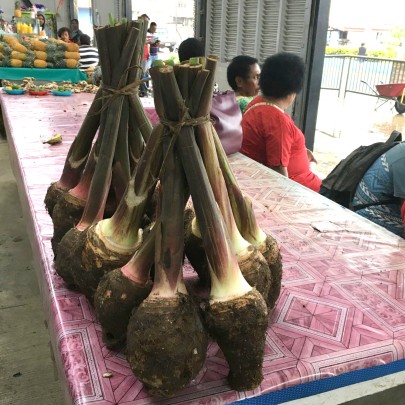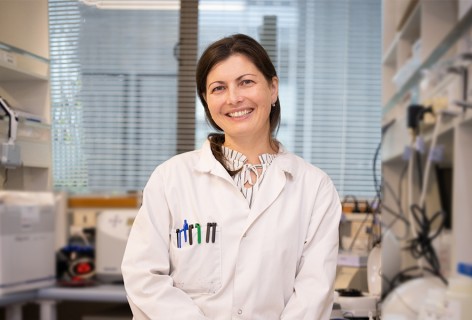Seed production and supply in Fiji
In this section

Taro for sale at Raki Raki market
In November 2022, Manaaki Whenua's Caroline Mitchell, Ana Podolyan and Gary Houliston spent ten days in Fiji, delivering training to our Pacific Seeds for Life (PS4L) partners from Centre for Pacific Crops and Trees (CePaCT), learning about seed-to-farmer pathways, and surveying the distribution of different taro varieties sold at the markets around the Viti Levu island.
Research at CePaCT
Amit Sukal (Associate Scientist – Germplasm health) heads the team of young researchers at the CePaCT tissue culture facility where the shelves of the tissue culture facility are stacked with small vials containing seedlings of taro, yam, coconut, banana, sweet potato and other Pacific crops; older plants are grown in pots in the nearby shade houses.
Training CePaCT staff
Manaaki Whenua plays a key role in screening the collection and training of CePaCT staff. Ana and Caroline trained two CePaCT researchers in the GEM lab earlier this year and more training was scheduled for this trip. Caroline presented a plant genotyping workshop and Ana carried out a basic sequence analysis training and a workshop on scientific writing. All training was very well received and additional sessions in genotyping and bioinformatics were discussed for the future.
CePaCT is the only organisation in Fiji, which is screening its seeds for diseases and therefore is under a lot of pressure to supply clean seedlings to farmers, which directs substantial amounts of time, resources, and capability away from maintaining the collection. Understanding the current state of seed production and supply in Fiji could help to prioritise tasks at CePaCT and identify the most pressing problems to address.
The demand for seeds/seedlings in Fiji is high. Commercially available seeds are unaffordable to most growers therefore domestic seed production and supply are heavily subsidised by the Fijian government. The research stations and nurseries are under pressure to produce enough cheap seeds for farmers, however due to plant diseases and lack of appropriate facilities and equipment, the supply of seeds cannot satisfy the demand. On top of that, tropical cyclones threaten the production of seeds, contributing to the problem.
Innovation and community education
Several innovative solutions are now being employed at some commercial nurseries, such as ‘Bula Agro’, where shipping containers are used to effectively store large quantities of very fragile seedlings during cyclones and larger plants are grown in pots to speed up their recovery after major flooding events. This nursery is also involved in the education of local communities with the big aspiration to make every household in Fiji able to grow their own food.
Research stations are at the front of documenting the biodiversity of the country. These include the insect collection at Koronivia, the germplasm collections of Pacific crops at the Dobuilevu research station which has an impressive collection of 27 yam and 53 taro varieties, and the Legalega research station that specialises in growing seeds for farmers – mostly pulses, but also other crops such as mango varieties, including some very large mango and the mushroom growing centre, established several years ago by China Aid.
However, most plants in the collections suffer from diseases caused by fungi such as anthracnoses which is widespread throughout the island and affects other crops such as chilli, insects and viruses. Weeds contribute to the spread of diseases but are difficult to control in a tropical climate.
The staff at research stations have highlighted the need for molecular testing of their crops to ensure the quality of seeds/seedlings they grow for farmers, and some, such as Koronivia Research Station have already refurbished their spaces to accommodate a molecular laboratory. Training in molecular skills is now their priority.












